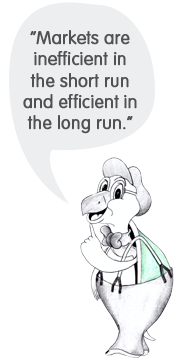Home / Behavioral Finance
History has shown that equities have been the best investment vehicle over any long-term period. However, ask any investor and most of them will say that they have lost money on the stock markets. Why this anomaly? The reason is that successful investing requires many things. The first is the discipline to follow the chosen investment strategy. Next comes the ability to choose the proper stocks by doing research or using the services of professionals in the field of investments. Finally, and most importantly, we need to understand that stock prices in the short run are more a function of people's emotions than the fundamentals of the underlying companies.
This is where most investors lose out. They fall prey to their own and sometimes others' mistakes due to the use of emotions in financial decision-making. This often repeated phenomenon was the genesis of the branch of finance known as Behavioral Finance. Behavioral Finance is the study of how people in general and investors in particular make common errors in their financial decision making due to their emotions. It is the study of psychology and finance.
This brings us to the point - is Behavioral Finance really effective? We at PPFAS Ltd. strongly believe that it is. An understanding of Behavioral Finance will make us better money managers. We will be able to recognise when our behaviour may not be in our own best interests. We will better understand why markets behave the way they do and will be better equipped to evaluate information obtained from the media and elsewhere. Behavioral Finance is crucial in understanding certain common and predictable errors made by investors and then profiting from it. These behavioral anomalies include Mental Accounting, Anchoring, Overconfidence, use of Mental Heuristics, Loss Aversion, Sunk Cost Fallacy, Decision Paralysis, Endowment Effect, Winner's Curse, and many more. Behavioral Finance is important because it helps us in recognising that the market is inefficient in the short run and frequently mis-prices securities. As investors become aware of these instances of mis-pricing they can act appropriately and since the market is efficient in the long run it will correct these anomalies and the investor will benefit. As Benjamin Graham, the father of security analysis, has put it, "In the short run the market is a voting machine but in the long run it is a weighing machine."
At PPFAS Ltd. we have been using Behavioral Finance, which helped us to avoid the herd mentality that was evident in the TMT rally of the late 90's. In fact it is a core part of our portfolio strategy and we use its teachings to the advantage of our Portfolio Management clients. For example, we will try to evaluate companies on their intrinsic strengths and long term potential but use the behavioral traits of the market to identify any mis-pricing in their stocks.
However, we would like to stress on one thing. Behavioral Finance is not a remedy to master the art of stock picking. It does not involve models or formulae to help us pick the right stocks at the right price. One needs to understand that there can never be any sure shot way to make money either on the stock markets or anywhere else. Behavioral Finance will only provide us a framework to try and outperform the market by being aware of our emotions as well as those of others and using this information to our advantage. We would like to follow the greatest investor of all times, Warren Buffett, who has said that "Rule no 1 is - Don't lose money and Rule no 2 is - Don't forget rule no 1".

